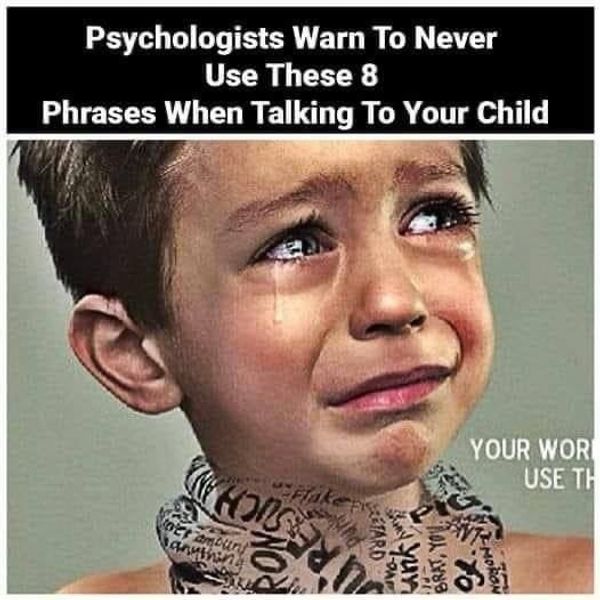As parents, we play a crucial role in shaping our children’s lives. During their formative years, it’s important to make them feel loved and supported. They rely on us for guidance and understanding. The words we use with our children carry more weight than we realize. Children often take everything we say to heart and consider it as absolute truth.

Below are seven phrases that should never be used when speaking to your child:
1. “Stop crying”
You should never dismiss your child’s emotions by telling them to stop crying. Suppressing their feelings can send the wrong message. Instead, allow them to express their emotions and help them understand what went wrong. It’s important to teach them healthy ways to cope with their feelings.
2. “You disappointed me!”
Avoid making your child feel like a failure. This can have long-lasting effects on their self-esteem, as nobody wants to disappoint their parents. If they make a mistake, it is our responsibility to communicate it to them. But we should do so in a gentle and constructive manner.
3. “You are not good enough”
Never make your child feel inadequate or compare them to others, whether it’s about their abilities or behavior. It can be emotionally distressing for a child to believe that they don’t meet their parents’ expectations or that they are different from their peers. Instead, emphasize that there is always room for improvement and encourage them to believe in themselves.
4. “Big boys/girls don’t get scared”
Telling your child not to be scared doesn’t make their fears disappear. It’s important to acknowledge their feelings and reassure them that it’s normal to feel scared at times. Help them develop resilience by teaching them healthy ways to cope with fear.
5. “You are a bad boy/girl”
Avoid labeling your child as “bad.” Instead, focus on their behavior and explain the consequences of their actions. Remember, everyone makes mistakes, including adults. Help them understand the importance of making better choices in the future.
6. “I do everything for you”
Kids naturally expect their parents to take care of them, and that’s our job as parents. However, it’s important to foster independence and teach them responsibility. Encourage them to take on age-appropriate tasks and gradually become more self-reliant.
7. “You’re fat/dark/ugly”
Our children should feel safe in their own home. Avoid body-shaming your child or making negative comments about their appearance. Such remarks can lead to negative body image and low self-esteem. Instead, promote healthy eating habits and encourage physical activity as part of a balanced lifestyle.
Remember, our words have a lasting impact on our children. It’s important to create a nurturing environment where they feel loved, accepted, and supported. By building their self-esteem and inspiring them to succeed, we can help them become confident and resilient adults.





